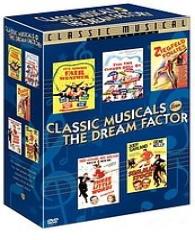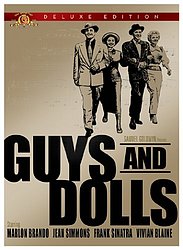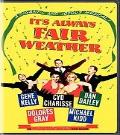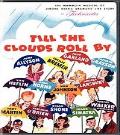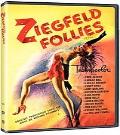
Knight at HOME at the Movies
Fabu-lush 50s Musicals...and then some
True, the 40s were the golden age for the musical but the decade that followed had its share of musical niceties as this
week's DVD recommendations prove.
True, the 40s were the golden age for the musical but the decade that followed had its share of musical niceties as this
week's DVD recommendations prove.
All hail Warner Bros. Home Video for their continued care and respect of both their classic
catalogue and MGM's as well. After last year's stellar Classic Musical Collection: Broadway
to Hollywood I eagerly looked forward to their next boxed set and it's here at last. Three
out of five of the Classic Musicals from the Dream Factory are from the final
years of the famed heyday of the musical at MGM. Though neither Three Little Words,
Summer Stock are in the same league as many of the musicals dreamed up by the famed
Freed Unit and featuring the same stars, both have highly memorable moments and bear
the stamp of quality and creativity that was a hallmark not just of the Freed Unit but the
MGM musical period.
The least remembered film in the set, Three Little Words (1950) was to have starred Judy
Garland but Vera Ellen (she with the tiniest waist on record) stepped in when Judy got sick.
But Ellen dances beautifully with star Fred Astaire and there is hilarious support from Red
Skelton and sexpot Arlene Dahl. It's the loose story of tin pan alley era songwriters Bert
Kahlmer and Harry Ruby (they came up with "I Wanna Be Loved By You" lip synced by a
very young Debbie Reynolds in the movie). An enjoyable but lesser effort, directed by
Richard Thorpe.
Summer Stock (1950) co-starred Garland with Gene Kelly in a very thin excuse for a fairly
pleasing musical in which farm owner Judy gives over her barn to a group of extremely
talented singers and dancers (including Judy's younger sister played by Gloria DeHaven)
so they can put on a show. This includes the justly famous "Get Happy" number shot
months after the picture was completed, hence Judy's noticeable weight loss. It was also,
sadly, the last number she shot before leaving MGM. Judy also sings a sweet little song
called "Friendly Star" and Phil Silvers adds comic relief.
Next is the most recent film in the set, It's Always Fair Weather (1955). After the popular
success of the truly fabu-lush and funny Singin' in the Rain (1952) and its sophisticated
counterpart, The Band Wagon (1953), writers Comden and Green, who had spoofed movies
and Broadway respectively in those two efforts, next made what is probably the first spoof
of television. The story, a sort of sequel to On the Town, concerns a reunion of three
ex-sailors who really no longer have much in common. Gene Kelly, Dan Dailey and
choreographer Michael Kidd play the sailors, and Cyd Charisse a television programmer
who wants to televise their reunion. Adding memorable support (and the movie's best
song, "Thanks But No Thanks") is Dolores Gray as the over the top TV emcee. Again,
though this is a notch below previous Comden-Green efforts, that's still several notches
above other musicals of the period.
Finally, the set includes two basically all music revue movies from the mid-40s. The first
is the Vincent Minnelli directed Ziegfeld Follies (1946), which begins and ends with William
Powell recreating the role of the theatrical impresario in Heaven (!) dreaming up his
grandest show ever. A series of eye popping musical numbers and so-so comedy
sketches follow. MGM literally dragged every star on the lot, it seems, into the picture.
Highlights include the Fred Astaire-Gene Kelly duet dance number, Fred with Lucille Bremer
singing and dancing the "This Heart of Mine" and "Limehouse Blues" numbers (with both
made up as Orientals) and the infamous (to gay men anyway) Judy Garland "Madame
Crematon gives an interview" song. Though Judy does her usual masterful job, it's those
breathtaking chorus boys pretending to care more about Judy than each other that grabs
my attention now. Lucille Ball also makes a memorable (and silent) appearance (and
that's her on the box cover) as a pink gowned lady who applies her whip (literally) to a
cage full of ladies dressed as cats. Ball's titian locks look breathtaking (the film's real
triumph is it's cinematography, art direction and costume design). The Jerome Kern
bio-pic Til the Clouds Roll By (1947) is the last of the set. It too is stretched from end to
end with fabulous musical numbers (including Garland singing "Look for the Silver Lining"
and "Who?"). This film has been in the public realm for years and it's good to FINALLY
see a studio endorsed print that looks terrific.
Each of the discs includes nice, new making of featurettes, vintage cartoons and other
material and are available separately but the set's the best deal with bargain pricing.
Another fabu-lush 50s musical thanks to its score is the Sam Goldwyn produced Guys
and Dolls (1955). MGM Home Video has released a Widescreen Deluxe Edition of the
classic story of Manhattan gamblers, show girls, Salvation Army workers and a lot of
colorful folks with names like "Nicely Nicely Johnson" that will have fans of the film rockin'
the boat with excitement over the movie's anamorphic new transfer and all the extras.
They start with a beautiful reprint of the 72-page opening night premiere booklet that
comes inside the packaging. After devouring that, it's on to some really well thought out
documentaries shot for the new edition. The genesis of the show and the genius of Frank
Loesser, the show's composer-lyricist, is described by his children as is the source material
by writer Damon Runyon. There's a lot of interesting behind the scenes stuff about cast
members Marlon Brando, Frank Sinatra, Jean Simmons and Vivian Blaine from the talking
heads (they include choreographer Michael Kidd). The only thing missing for me was a
nod to the 90s revival with Nathan Lane, Peter Gallagher and Faith Prince that brought a
whole new crop of fans to the show.
Guys and Dolls, as noted, is still one of the most performed shows in America (I was one
of those gamblers down in the sewer in high school) and the reason for that is that even
when it was first performed it was locked into an artificial world that never really existed.
Director Joe Mankiewicz had never directed a musical before (Michael Kidd staged the
songs) and the film was purposely kept inside the artifice of the studio which clearly
defines it as fantasy. Devoted followers won't think the 2 1/2 hour running time is too
long but okay, yeah, it is. But when you have the stunning Brando at the apex of his
beauty in those perfectly tailored Irene Sharaff suits singing "Luck Be A Lady," gorgeous
Jean Simmons and the voice of Sinatra (also at its height), complainers best learn to
"follow the fold" like the rest of us!
catalogue and MGM's as well. After last year's stellar Classic Musical Collection: Broadway
to Hollywood I eagerly looked forward to their next boxed set and it's here at last. Three
out of five of the Classic Musicals from the Dream Factory are from the final
years of the famed heyday of the musical at MGM. Though neither Three Little Words,
Summer Stock are in the same league as many of the musicals dreamed up by the famed
Freed Unit and featuring the same stars, both have highly memorable moments and bear
the stamp of quality and creativity that was a hallmark not just of the Freed Unit but the
MGM musical period.
The least remembered film in the set, Three Little Words (1950) was to have starred Judy
Garland but Vera Ellen (she with the tiniest waist on record) stepped in when Judy got sick.
But Ellen dances beautifully with star Fred Astaire and there is hilarious support from Red
Skelton and sexpot Arlene Dahl. It's the loose story of tin pan alley era songwriters Bert
Kahlmer and Harry Ruby (they came up with "I Wanna Be Loved By You" lip synced by a
very young Debbie Reynolds in the movie). An enjoyable but lesser effort, directed by
Richard Thorpe.
Summer Stock (1950) co-starred Garland with Gene Kelly in a very thin excuse for a fairly
pleasing musical in which farm owner Judy gives over her barn to a group of extremely
talented singers and dancers (including Judy's younger sister played by Gloria DeHaven)
so they can put on a show. This includes the justly famous "Get Happy" number shot
months after the picture was completed, hence Judy's noticeable weight loss. It was also,
sadly, the last number she shot before leaving MGM. Judy also sings a sweet little song
called "Friendly Star" and Phil Silvers adds comic relief.
Next is the most recent film in the set, It's Always Fair Weather (1955). After the popular
success of the truly fabu-lush and funny Singin' in the Rain (1952) and its sophisticated
counterpart, The Band Wagon (1953), writers Comden and Green, who had spoofed movies
and Broadway respectively in those two efforts, next made what is probably the first spoof
of television. The story, a sort of sequel to On the Town, concerns a reunion of three
ex-sailors who really no longer have much in common. Gene Kelly, Dan Dailey and
choreographer Michael Kidd play the sailors, and Cyd Charisse a television programmer
who wants to televise their reunion. Adding memorable support (and the movie's best
song, "Thanks But No Thanks") is Dolores Gray as the over the top TV emcee. Again,
though this is a notch below previous Comden-Green efforts, that's still several notches
above other musicals of the period.
Finally, the set includes two basically all music revue movies from the mid-40s. The first
is the Vincent Minnelli directed Ziegfeld Follies (1946), which begins and ends with William
Powell recreating the role of the theatrical impresario in Heaven (!) dreaming up his
grandest show ever. A series of eye popping musical numbers and so-so comedy
sketches follow. MGM literally dragged every star on the lot, it seems, into the picture.
Highlights include the Fred Astaire-Gene Kelly duet dance number, Fred with Lucille Bremer
singing and dancing the "This Heart of Mine" and "Limehouse Blues" numbers (with both
made up as Orientals) and the infamous (to gay men anyway) Judy Garland "Madame
Crematon gives an interview" song. Though Judy does her usual masterful job, it's those
breathtaking chorus boys pretending to care more about Judy than each other that grabs
my attention now. Lucille Ball also makes a memorable (and silent) appearance (and
that's her on the box cover) as a pink gowned lady who applies her whip (literally) to a
cage full of ladies dressed as cats. Ball's titian locks look breathtaking (the film's real
triumph is it's cinematography, art direction and costume design). The Jerome Kern
bio-pic Til the Clouds Roll By (1947) is the last of the set. It too is stretched from end to
end with fabulous musical numbers (including Garland singing "Look for the Silver Lining"
and "Who?"). This film has been in the public realm for years and it's good to FINALLY
see a studio endorsed print that looks terrific.
Each of the discs includes nice, new making of featurettes, vintage cartoons and other
material and are available separately but the set's the best deal with bargain pricing.
Another fabu-lush 50s musical thanks to its score is the Sam Goldwyn produced Guys
and Dolls (1955). MGM Home Video has released a Widescreen Deluxe Edition of the
classic story of Manhattan gamblers, show girls, Salvation Army workers and a lot of
colorful folks with names like "Nicely Nicely Johnson" that will have fans of the film rockin'
the boat with excitement over the movie's anamorphic new transfer and all the extras.
They start with a beautiful reprint of the 72-page opening night premiere booklet that
comes inside the packaging. After devouring that, it's on to some really well thought out
documentaries shot for the new edition. The genesis of the show and the genius of Frank
Loesser, the show's composer-lyricist, is described by his children as is the source material
by writer Damon Runyon. There's a lot of interesting behind the scenes stuff about cast
members Marlon Brando, Frank Sinatra, Jean Simmons and Vivian Blaine from the talking
heads (they include choreographer Michael Kidd). The only thing missing for me was a
nod to the 90s revival with Nathan Lane, Peter Gallagher and Faith Prince that brought a
whole new crop of fans to the show.
Guys and Dolls, as noted, is still one of the most performed shows in America (I was one
of those gamblers down in the sewer in high school) and the reason for that is that even
when it was first performed it was locked into an artificial world that never really existed.
Director Joe Mankiewicz had never directed a musical before (Michael Kidd staged the
songs) and the film was purposely kept inside the artifice of the studio which clearly
defines it as fantasy. Devoted followers won't think the 2 1/2 hour running time is too
long but okay, yeah, it is. But when you have the stunning Brando at the apex of his
beauty in those perfectly tailored Irene Sharaff suits singing "Luck Be A Lady," gorgeous
Jean Simmons and the voice of Sinatra (also at its height), complainers best learn to
"follow the fold" like the rest of us!
